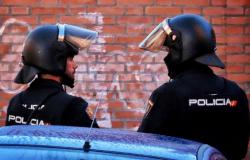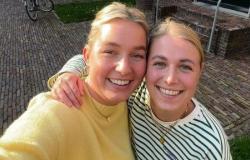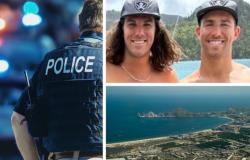April 25, 2024
In 1993, Rick (36) was diagnosed with aspartylglucosaminuria. What it means to live with this very rare and incurable metabolic disease, tells his mother Hanka (56). In 1994, she founded the VKS patient association together with other stakeholders. “Rick taught me to enjoy life intensely.”
Just like Girlfriend also brings My secret the most beautiful personal stories, which we would like to share with you here every week.
”Nine years ago, Arjan, my husband and father of Rick and our daughter Sifra, died unexpectedly. Arjan was only 49 years old. Rick still talks about it every week. ‘Where is Arjan then?’ he asks, ‘Is he still coming?’ “No, he’s not coming, Rick, he died,” I say, but I know that the next time I see him, he will ask about Arjan again. I didn’t see any deep grief in Rick when his father died, but it’s still in his head, that’s clear. Arjan was part of Rick’s life. Rick’s realization is very different, for him everything has come to a standstill, that is one of the consequences of the very rare metabolic disease he has. His illness is the result of an extremely unusual coincidence of two hereditary faults together, half mine and half Arjan’s. A lottery, dumb luck. We could never have known in advance.”
Cheerful person
“Something goes wrong during the clean-up in all of Rick’s cells, it is a constant process of cell breakdown that cannot be treated or stopped, it is irreversible. There is no medicine against it. Trying to make life as pleasant as possible and limit pain and discomfort as much as possible is all that is possible. Aspartylglucosaminuria, as Rick’s metabolic disease is fully called, causes him to continue to deteriorate, both physically and mentally. At the moment he is mainly experiencing a lot of pain in his back and pelvic area, but his thinking is also deteriorating further and further, you can compare it a bit with dementia. In the last year he has also had increasing problems with his speech. His life expectancy is estimated to be between twenty and forty. Rick is now 36. I realize that the end is near. You have to think about the end, it is better to anticipate what awaits you. I think I am privileged because I can think about what I want and what I don’t want. Rick shouldn’t have to live for me. When the time comes, I will do everything to ensure that the farewell is worthy of Rick, because a good life also includes a good farewell. Rick is a positive and cheerful person with a great sense of humor. He is an extremely endearing personality. Rick has had an impact on many lives. Many people could take an example from him.
As a young mother, I started worrying about Rick when he was a toddler. He was a thin, full of life, but extremely busy little boy. ADHD did not exist at that time, otherwise that would probably have been the diagnosis. When Rick was about three years old I started noticing things. He started walking, but he was very careless and, in addition to being busy, Rick was also sick very regularly. He often had asthmatic complaints, snot and ear infections and also seemed to be somewhat behind in his development.”
Diagnosis
“In retrospect, these were all symptoms that pointed to the disease that would later emerge, but it was clear to the pediatrician I visited that this was a parenting problem. A physical cause was absolutely not considered. The investigation that followed was aimed at exactly that: ruling out a physical cause, but a substance was indeed found in Rick’s urine that required further investigation. Research for which we were referred to an academic hospital. Finally the diagnosis came in 1993: Rick had aspartylglucosaminuria, an extremely rare metabolic disease. We as parents had no idea what that meant and entailed. I knew nothing about this disease, had never heard of it. It was also far too rare, almost nothing was known about it. The first year after diagnosis you try everything to find out what the disease is and means, for your child, for yourself as a parent and for life and the future. Before the diagnosis I had never read a scientific text, but now I wanted to delve into this disease and read everything that had been published about it. I also started looking for people who were dealing with metabolic diseases. Anything to get information. It turned out that there was a group of pediatricians in academic hospitals in the Netherlands who dealt with metabolic diseases, but it was all on a very modest scale. There are an estimated seven people in the Netherlands, two of whom are minors, with the disease that Rick has and that rarity makes it extra difficult to get research funded. But together there are eighteen hundred different metabolic diseases. There are now about one hundred and fifty professionals who have formed expertise centers and also have contact with foreign countries. Knowledge is being shared, but there is not nearly enough knowledge to actually make a difference in preventing, treating and even curing all diseases. When you deal with a disease like this, your world is completely turned upside down. I had a child who is different and you don’t want that for your child, because you know that implies that life will be difficult for him. It also touches on your motherly pride, because all your dreams for the future can be thrown overboard. “I’m going to be a firefighter when I grow up,” Rick said as a little boy, but I knew: he won’t be one.”
Fellow sufferers
“The idea for founding the VKS patient association arose when I started looking beyond the Netherlands. It turned out that there was an organization in England for metabolic diseases, from there our association was founded. A similar association has also been set up in Belgium. Three pillars are the most important for our association: contact with fellow sufferers, provision of information and advocacy for all people affected by this. Everyone has their own feeling about this, emotions are unique, but sharing stories can help others move forward. Because they are all rare diseases, it is not that easy to meet a fellow sufferer. The very first thing we did as an association was to publish a brochure with examples of various metabolic diseases. We also felt it was important to pay attention to the impact such a disease has on the family, siblings and other relatives. A diagnosis like this changes everything. There have been cases of suicide and many parents separate because they cannot cope with the grief or deal with it in different ways. Bringing people together can break the isolation that families can find themselves in. My daughter Sifra is now 31 and crazy about her brother and he about her. That has not always been the case. In the past, she often felt like she came second. She also had to learn to live with the thought that she was going to lose her older brother. Fortunately, she has found a way to deal with that thought and enjoys Rick as much as she can, but that doesn’t make the sadness any smaller or the situation any less difficult. I feel like it also had an influence on her relationships, her self-image and her sense of responsibility. You often see this in children from ‘care families’. She lives alone, but luckily she has a stable life. Rick has lived away from home since he was nine, first part of the week and since he was twenty full-time. It is the best living environment for him. The great care needs he has cannot be met at home. Rick needs a lot of closeness, because he no longer understands the world. Losing control over life is very frustrating. Someone with gray hair is a grandfather to Rick and if you stand behind a pole no one sees you. He grows towards total dependence, returns again and again to the small. Rick still has basic human needs, for warmth, contact, understanding and a hug. His emotional antennae work extremely well, he senses that you have good intentions for him.”
Letting go
“I often visit Rick, his reaction varies. Sometimes he doesn’t respond to anything when I come in, but usually he recognizes me. And when I’m not there, he always talks about me. Rick is at my house every Sunday afternoon. After two hours it’s over and then he goes back. You get children to let them go, you just walk along for a while. Letting go is part of the process, it is a natural thing and it is no different with a disabled child. Yet he also gave me a lot of positive things. I care for two foster children with intellectual disabilities, I would never have known them without Rick. I was able to make my work from the association we set up and got to know people and do things in areas I would otherwise have known nothing about. Without a scientific background, through the work of VKS I have an influence on all people who deal with metabolic diseases as doctors or researchers. This improves care for people who also suffer from such a disease. And, perhaps most importantly, Rick has taught me to enjoy intensely. Rick does not see everything that can go wrong in life. So you see that something good can also come from something bad. “Go home and make the best of it,” the doctor told us at the time. Fortunately, those days are over. Technology advances, knowledge increases. For example, if caught early, treatment can improve the quality of life. Stem cell transplantation may also be an option. There is a prospect of developing a medicine very far away. Rick won’t be able to help it anymore, we know how it will turn out for him, but maybe in the future we can spare future children this cruel fate.”
Are you thinking about suicide or worried about someone? Call 0800-0113 or visit www.113.nl
Text: Lydia Zittema
Photo: private property
More My Secret? Take out a digital subscription now or view the Facebook page.






